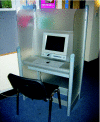How patients use access to their full health records: a qualitative study of patients in general practice
- PMID: 19966130
- PMCID: PMC2789021
- DOI: 10.1258/jrsm.2009.090328
How patients use access to their full health records: a qualitative study of patients in general practice
Abstract
Objective: To explore how patients use record access, its impact and the benefits and drawbacks of using it.
Design: Qualitative study using focus group interviews, individual interviews and telephone interviews.
Setting: General practice offering electronic access to full medical records using PAERS system.
Participants: Forty-three patients aged between 20 and 71 years participated. Of these, nine were in the healthy group, eight had long-term health conditions, 10 were in the mental health group and 16 were pregnant.
Results: Three themes emerged as to how patients used record access - participation in care, quality of care and self-care strategies. Record access was used to help prepare patients for consultations, compensate for poor or complex communication during consultations and to reduce the fragmentation of care. Record access had a small impact on health behavior intentions. Overall patients felt that record access reinforced trust and confidence in doctors and helped them feel like partners in healthcare.
Conclusion: This study suggests that record access improves shared management, with patients using their records to improve interactions with healthcare providers, make decisions about their health and improve the quality of the care they receive. These findings also suggest a possible long-term potential for record access to improve health outcomes.
Similar articles
-
Patient experiences and attitudes about access to a patient electronic health care record and linked web messaging.J Am Med Inform Assoc. 2004 Nov-Dec;11(6):505-13. doi: 10.1197/jamia.M1593. Epub 2004 Aug 6. J Am Med Inform Assoc. 2004. PMID: 15299001 Free PMC article.
-
Electronic medical summaries in general practice--considering the patient's contribution.Br J Gen Pract. 2003 Apr;53(489):293-7. Br J Gen Pract. 2003. PMID: 12879829 Free PMC article.
-
Patient experiences with full electronic access to health records and clinical notes through the My HealtheVet Personal Health Record Pilot: qualitative study.J Med Internet Res. 2013 Mar 27;15(3):e65. doi: 10.2196/jmir.2356. J Med Internet Res. 2013. PMID: 23535584 Free PMC article.
-
The Impact of Patient Online Access to Computerized Medical Records and Services on Type 2 Diabetes: Systematic Review.J Med Internet Res. 2018 Jul 6;20(7):e235. doi: 10.2196/jmir.7858. J Med Internet Res. 2018. PMID: 29980499 Free PMC article.
-
Electronic communication with patients. Evaluation of distance medicine technology.JAMA. 1997 Jul 9;278(2):152-9. JAMA. 1997. PMID: 9214532 Review.
Cited by
-
The patients' active role in managing a personal electronic health record: a qualitative analysis.Support Care Cancer. 2015 Sep;23(9):2613-21. doi: 10.1007/s00520-015-2620-1. Epub 2015 Feb 5. Support Care Cancer. 2015. PMID: 25652149
-
Designing a Patient Portal for Patient-Centered Care: Cross-Sectional Survey.J Med Internet Res. 2018 Oct 1;20(10):e269. doi: 10.2196/jmir.9497. J Med Internet Res. 2018. PMID: 30287416 Free PMC article.
-
Patient access to medical records and healthcare outcomes: a systematic review.J Am Med Inform Assoc. 2014 Jul-Aug;21(4):737-41. doi: 10.1136/amiajnl-2013-002239. Epub 2013 Oct 23. J Am Med Inform Assoc. 2014. PMID: 24154835 Free PMC article.
-
Utilizing a Prototype Patient-Controlled Electronic Health Record in Germany: Qualitative Analysis of User-Reported Perceptions and Perspectives.JMIR Form Res. 2018 Aug 3;2(2):e10411. doi: 10.2196/10411. JMIR Form Res. 2018. PMID: 30684411 Free PMC article.
-
Patient Centeredness in Electronic Communication: Evaluation of Patient-to-Health Care Team Secure Messaging.J Med Internet Res. 2018 Mar 8;20(3):e82. doi: 10.2196/jmir.8801. J Med Internet Res. 2018. PMID: 29519774 Free PMC article.
References
Publication types
MeSH terms
LinkOut - more resources
Full Text Sources


